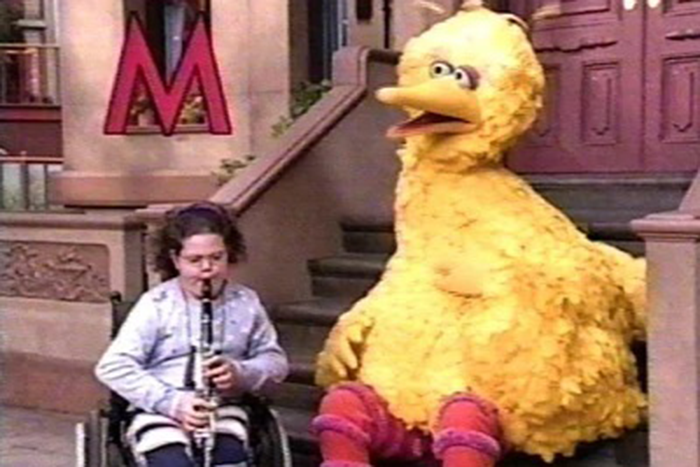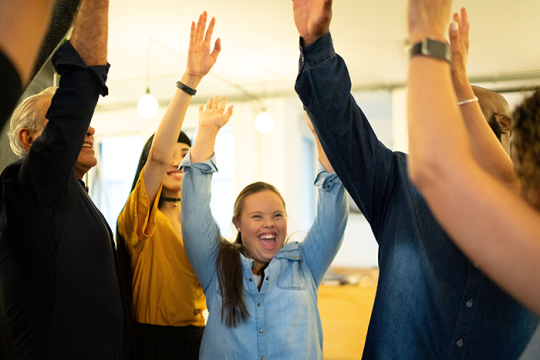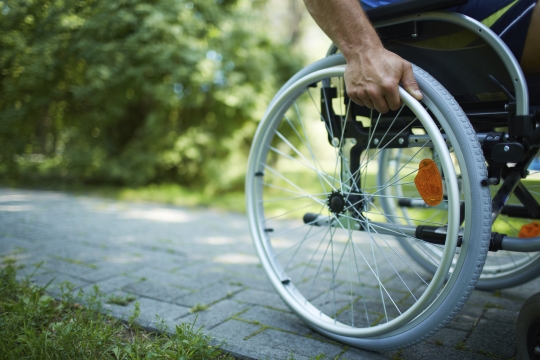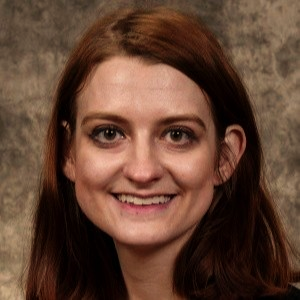
Emily Ladau, age 10, during her time on Sesame Street with Big Bird.
Emily Ladau is a Jewish disability rights activist, writer, storyteller, and digital communications consultant who recently received the Women's Media Center Progressive Women's Voices IMPACT Award. At the age of 10, Emily appeared on Sesame Street to help educate children about life with a physical disability. She now has made disability advocacy her life's work. She co-hosts The Accessible Stall Podcast and recently wrote a book, "Demystifying Disability: What to Know, What to Say, and How to be an Ally." She is a proud Reform Jew who works with the URJ as a consultant to promote a culture of inclusion around disability.
We sat down with Emily to chat about how Jewish values inform her work and what employers, employees, and coworkers can do to proactively affirm people with disabilities in the workplace.
What inspires your disability rights activism?
When I was 10 years old, I had the opportunity to appear on multiple episodes of Sesame Street to educate kids about my life with a physical disability as a wheelchair user. At age 10, I don't think I fully appreciated the importance of having that privilege. As I got older, though, I think that was really the launching pad for a lot of the work that I do in my career as a communicator and an advocate around disability.
What are some Jewish values that inform your activism?
One concept is the quote from the Mishnah, "You are not obligated to complete the work, but neither are you free to abandon it." (Pirkei Avot 2:16). It's a reminder to me that nobody is responsible for bearing the full weight of advocacy. I'm trying to be one small part of a community working to change the world and follow in the path of those who have done the work before me. We may not finish it, but we can create a better path for the generations that come after us. To me, it also means that while you may have a duty to continue the work, that doesn't mean that you can't also take care of yourself in the process, since you're not alone in the work that you do.
I think an obvious one is , focusing on how we can heal the world. But I think "healing" is an interesting concept in relation to disability, because I do not want people to heal me or perceive me as broken; I want people to recognize that we live in a world that is not accessible to people with disabilities, and that is what we need to repair. My hope is that we focus not on changing people, but on changing the world to be more welcoming to all people.
Speaking of making the world more welcoming to all people, what are some proactive steps that employers can take to be accessible?
I think it's important to focus on communication. If we are not openly communicating about our diversity, equity, and inclusion work, and if we are not engaging marginalized communities, we're automatically leaving talent at the door and automatically disregarding so many people who could bring so much to our organizations. So, it's really about communicating that commitment to inclusion, and ensuring that the hiring process is welcoming, inclusive, accommodating, and accessible.
Employers should take the lead in modeling inclusive business [and hiring] practices by checking in with employees, making sure that they have what they need, and that they know they're welcome to ask for accommodations. If employers truly live out their values of being disability inclusive, that really comes through and creates a more comfortable space for everybody. Without living the value of inclusion and just providing physical accessibility, such as having ramps, accessible bathrooms, large print materials, and having captioning at Zoom meetings, employers are at risk of missing the big picture. It's about a holistic approach to fostering community conversation.
What are some things colleagues can do to be proactive allies?
I think the most important thing to recognize is that "ally" is not just a title you give yourself. It's about ongoing communication with colleagues: checking in and saying, "hey, how can I support you?" Owning up to saying something that might have been harmful and learning from that mistake. If somebody gives feedback about how a process could be more accessible, it's important to take that feedback and work in partnership with your colleagues with disabilities to create a more accessible environment.
The best thing that anyone can do to be an ally, especially in the workplace, is not make assumptions such as assuming someone needs their help with a task rather than asking or, on the flip side, assuming that a person is fine doing something but not checking in with them about how to make tasks more accessible. Open dialogue and working together to figure out the best plan forward is key. Another step colleagues with and without disabilities can take is advocating for inclusive policies within their organization. Some good resources are available through the Employer Assistance and Resource Network on Disability Inclusion and the Job Accommodation Network.
Do you have any tips for employees with disabilities when advocating for themselves in the workplace?
I think the root of our fears comes from the stigma that we internalize around disability. We are taught that it is something that we are supposed to hide away and not talk about. If we do talk about it, we're made to feel a sense of shame, as though we are burdensome. In fact, we are human beings who have disabilities. It is simply a part of who we are, and there's nothing shameful about that.
Before we can show up as our whole selves in the workplace, we need to recognize that having a disability does not make us wrong or bad. Once we begin to shift those ideas about ourselves, we begin to open up in the workplace. We need to find our community, our allies, people who are going to support and speak up alongside us. Recognize that we can't support one another if we don't communicate with one another.
While we're not ever obligated to disclose anything about ourselves, when we begin to lean into and embrace our identity as part of who we are in the workplace, it becomes easier to talk about it.
If you need to advocate for yourself or ask for accommodation, have a game plan. Show up knowing what you need and don't apologize for it. Say something like, "I want to do the best that I can as an employee. Here's the support that I need to make that happen, and I'd like to work with you to make that happen."
If you would like to learn more about creating inclusive programming and workplaces, check out the Religious Action Center's Inclusive Programming Checklist.
Related Posts

A Place at the Table: How an Accessible Haggadah Creates a Seder of Belonging

Supporting Colleagues with Disabilities

